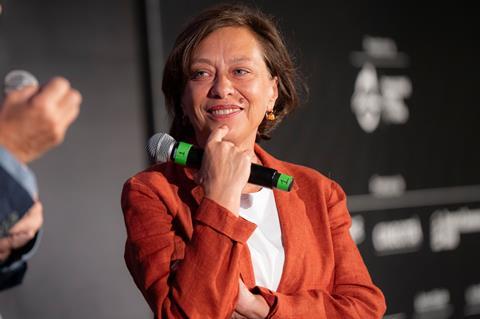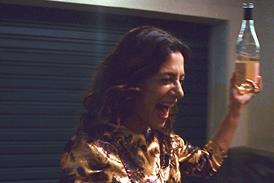
Paola Malanga is the artistic director of the Rome Film Festival, which kicks off today (October 15) with the world premiere of comedy La Vita Va Così by Riccardo Milani.
It is Malanga’s fourth edition at the helm of the festival, having joined in 2022 from Rai Cinema where she was deputy director of its product division spanning production and acquisition.
Malanga talks to Screen about how she is positioning the festival as an important launchpad for local and international films into the Italian market.
How do you see Rome’s place in the festival calendar?
Rome is a city festival, addressing every kind of audience a big city has. It’s for the audience of the city, but also for the industry, filmmakers and talents because they can find their audience. Every film, documentary, or series can find its audience here. For the Italian market, the festival is very significant. Tickets for many Italian and international titles sold out in an hour [after the launch of the programme].
How has the festival developed since you took over in 2022?
The structure has not changed, but it has evolved step by step in different directions. When I took over, there was no competition. The first thing I did was bring back competition [with the Progressive Cinema Competition] and a best first feature award, which is a cross-category award like in Cannes, giving more flavour to the festival. There is also the audience award for films in the Progressive Cinema competition. The jury and the audience meet in the competition, which is a nice challenge and interesting for sales.
We are still a ‘festa’ for the audience but are moving a bit in the direction of a [traditional film] festival. It’s our 20th anniversary this year. We are introducing a Progressive Lifetime Achievement, given to a career that is still evolving, to the impressive New York director Nia DaCosta. And we have a new Industry Lifetime Achievement which is going to legendary producer David Puttnam.
We also have two lifetime achievement awards going to Jafar Panahi (It Was Just An Accident) and Richard Linklater (Nouvelle Vague), and the master of film award is going to [German filmmaker] Edgar Reitz. His film, Leibniz – Chronicle Of A Lost Painting, presented at Berlin is exceptional.
We have another new award for documentaries. The best documentary award will recognise and thank people who spend years of their lives working on projects that can be told only through documentary language.
What about world premieres this year?
We are privileged to have three world premieres [of international films]: Asif Kapadia’s Kenny Dalglish; Julien Temple’s I Am Curious Johnny [about art collector, photographer and fashion designer] Jean “Johnny” Pigozzi; and François Caillat’s Temps Nouveaux [about a family of Italian miners]. All Italian films are world premieres in the Progressive Cinema Competition [Vincenzo Alfieri’s 40 Seconds; Andrea De Sica’s The Eyes Of Others, documentary Roberto Rossellini, More Than A Life; and Leandro Picarella’s Sciatunostro.]
Two years ago, Rome famously opened with Paola Cortellesi’s hit There’s Still Tomorrow. Tell us about your opening film this year.
We’re very happy that Paola Cortellesi is coming back as the president of the competition jury. This year’s opening film is La Vita Va Così by Riccardo Milani. It’s a comedy by a very well-known Italian director who usually performs well at the box office. Audiences love his films. It’s a story of ‘Green Resistance’, set in Sardinia.
One of the reasons we decided to open with a comedy is that wars, conflicts and dramatic situations can be seen throughout the festival’s line-up. But we need to find some optimism and remember that cinema can also dream.
Many of the films do address contemporary events, such as conflicts in Gaza and Ukraine.
We have different titles that reflect the present times [such as] Holding Liat, which won best documentary in Berlin, as well as 2000 Meters To Andriivka and Cuba & Alaska on the Ukraine war.
Last year, one of the big themes was democracy at risk. This year, we have titles which show art at risk, like Procès D’un Jeune Poète by Philippe Van Cutsem, about the poet Joseph Brodsky who was put on trial [in the Soviet Union] because of his poems, and Kim A Snyder’s The Librarians [about book censorship in the United States].
The festival is also full of films that give you the joy of life, of creativity, and of cinema. Richard Linklater’s Nouvelle Vague is about a genius of cinema at work. Edgar Reitz’s Leibniz movie is about a philosopher, but it is the story of the making of a painting. There is also an amazing documentary Roberto Rossellini, More Than A Life [a portrait of the director] – you realise how revolutionary, free and smart he was.
What is the festival’s engagement with the Italian industry like?
Many Italian distributors wait for the competition lineup to buy films. Most of the films in competition will be acquired by Italian buyers. Nino, a beautiful first feature by Pauline Loquès, has been acquired for distribution by an Italian distributor. So has Good Boy by Jan Komasa. Our Hero, Balthazar by Oscar Boyson with Asa Butterfield is about to be sold.
The profile that the films get in Italy through launching at Rome is important for the distributors. They are in talks also for Brian Cox’s Glenrothan, because it was only seen before in Toronto. There isn’t really an autumn market in Europe for films, so Rome is not just a festival – it is also becoming a buying ground, especially for the Italians who can’t go to Toronto.

























No comments yet